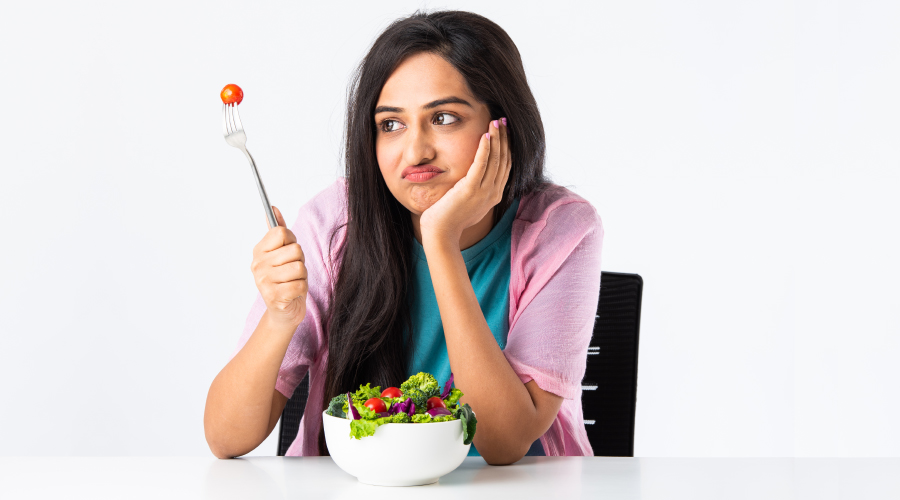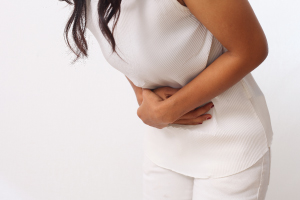

Knowing what to eat during periods and what to avoid, can make a huge difference between an uncomfortable period and a much more comfortable one. Different women experience different kinds of discomfort during their menstrual period. Bloating, cramps, mood swings, hormonal imbalance, diarrhoea, etc. are a few of them.
Experiencing these symptoms every month can be tiresome and can hinder the ability to function efficiently. Besides one’s lifestyle and workout routine, food intake can also influence menstrual symptoms. Eating the right kind of nutritious food helps reduce many of them.
Hormones play a vital role in regulating your appetite and helping your body maintain energy levels. While some hormones initiate hunger, others send signals to the body to indicate that you have eaten enough. When the right amount of food with the right nutrition is consumed, menstruation becomes much easier and a lot less uncomfortable.
Causes for Period Pain
Menstrual cramps, or dysmenorrhea, are cramping pains in the lower abdomen. A lot of women experience cramps just before or during their periods. Some of the common causes of period pain are :
- Release of prostaglandins, a chemical that promotes uterine contractions. High levels of prostaglandins can lead to excruciating cramping and severe pain during menstruation.
- Endometriosis is an underlying condition, where the tissue similar to the lining of the uterus grows outside of it. This can lead to severe pain and discomfort during periods as it acts in similar fashion.
- Adenomyosis is a condition in which the tissue lining the uterus grows into the muscular wall causing intense pain and cramping.
- Pelvic Inflammatory Disease (PID), is an infection of the female reproductive system, which usually occurs when sexually transmitted bacteria spread from the vagina to the womb, ovaries or fallopian tube.
- Uterine fibroids, which are noncancerous growths in the uterus, can cause pain and discomfort during menstruation.
What to Eat During Periods?
There are certain foods to eat during periods which can make your period more comfortable. Let’s take a look at them:
- Green leafy vegetables like broccoli, cauliflower, cabbage, spinach and kale are rich in magnesium and calcium which can help relieve period pain.
- Staying hydrated is very important. Drinking plenty of water can reduce symptoms of dehydration like headaches and can also help in avoiding water retention and bloating. Consuming water foods like watermelon, cucumber, papaya and strawberry can also help you stay hydrated.
- Yoghurt is a well-known probiotic. It helps in producing healthy gut bacteria which is very good for digestion and reduces bloating. Consumption of yoghurt can reduce muscle pain, cramps, anxiety and depression.
- Whole grains are rich in protein, fibre and vitamin B. These can help improve hormonal balance and prevent heavy flow during menstruation.
- Nuts are packed with all vital nutrients like protein, omega-3 fatty acids, magnesium and vitamins. They are one of the best foods to eat during periods. Consumption of nuts can help in reducing abdominal cramps and regulate mood swings.
Foods to Avoid During Period
Along with foods that help during your cycle, there are certain foods to avoid during period. These foods can intensify period discomfort and are best avoided. They can cause water retention, bloating, inflammation and painful cramps. You need to be aware of the food that you consume so that you can make the right choice when you eat.
1. Red Meat
Menstrual flow is caused when the uterus contracts and gets rid of the uterine lining. This process is brought about by a compound called prostaglandins that are produced by the body. Red meat contains high levels of prostaglandins, and hence, should be avoided.
2. Coffee
Caffeine is said to cause water retention in the body which leads to bloating. Caffeine blocks a hormone that can make blood vessels present in the uterus smaller. Reducing coffee intake during your period can help manage pain.
3. Sugar
A lot of women resort to sweets as comfort food during their period. But excess sugar can spike your blood sugar levels, triggering mood swings and depression. Consuming too much sugar can aggravate your period symptoms and leave you feeling drained. Try having a sweet fruit instead. Fruits like apples and grapes can prove to be healthy alternatives to artificial sugars.
4. Alcohol
Alcohol is one of the worst things to consume while on your period. It can have adverse effects on your hormone levels. Alcohol is also a blood thinner, which increases oestrogen levels, and hence can result in heavier flow during your period. It can also increase the production of testosterone, leading to mood swings and irritability.
5. Processed Food
High sodium content, unhealthy fat and lack of nutrients are a few reasons why you should avoid processed food during this time. High sodium can lead to water retention and bloating. Unhealthy fats can cause inflammation which is already high during menstruation.
Tips to Lessen Period Discomfort
Follow the tips given below to lessen discomfort during the period.
- Maintain a healthy lifestyle. Eat right and exercise well.
- Drink plenty of water. Staying hydrated is important.
- Choose healthier alternatives to satisfy food cravings.
- Consider dietary supplements like omega-3, if necessary.
- Eat balanced meals at regular intervals.
- Some yoga poses help ease the pain.
- There are a variety of herbal teas that help reduce cramping.
- Heat therapy like a heating pad or a warm bath can lessen the pain to a great extent.
- Over-the-counter pills also help.
- Massages with essential oils help relieve pain.
- Reducing stress
When to See a Doctor
The need to see a doctor arises under the following circumstances
- If you are bleeding heavily, soaking more than 8 pads in 8 hours.
- If you are older than 25, haven’t had cramps before and suddenly experience pain.
- If experiencing changes in your bleeding pattern.
- Cramping more than usual.
Conclusion
Choosing the right kind of food is important. You need to understand your body, recognize your symptoms and understand what to eat. Keep in mind the foods that you are allergic to before consuming them. Make informed choices regarding what to eat during periods for a smoother menstrual experience. If your period is very painful and hindering your daily activities, it is advisable to consult your doctor for personalised advice.




